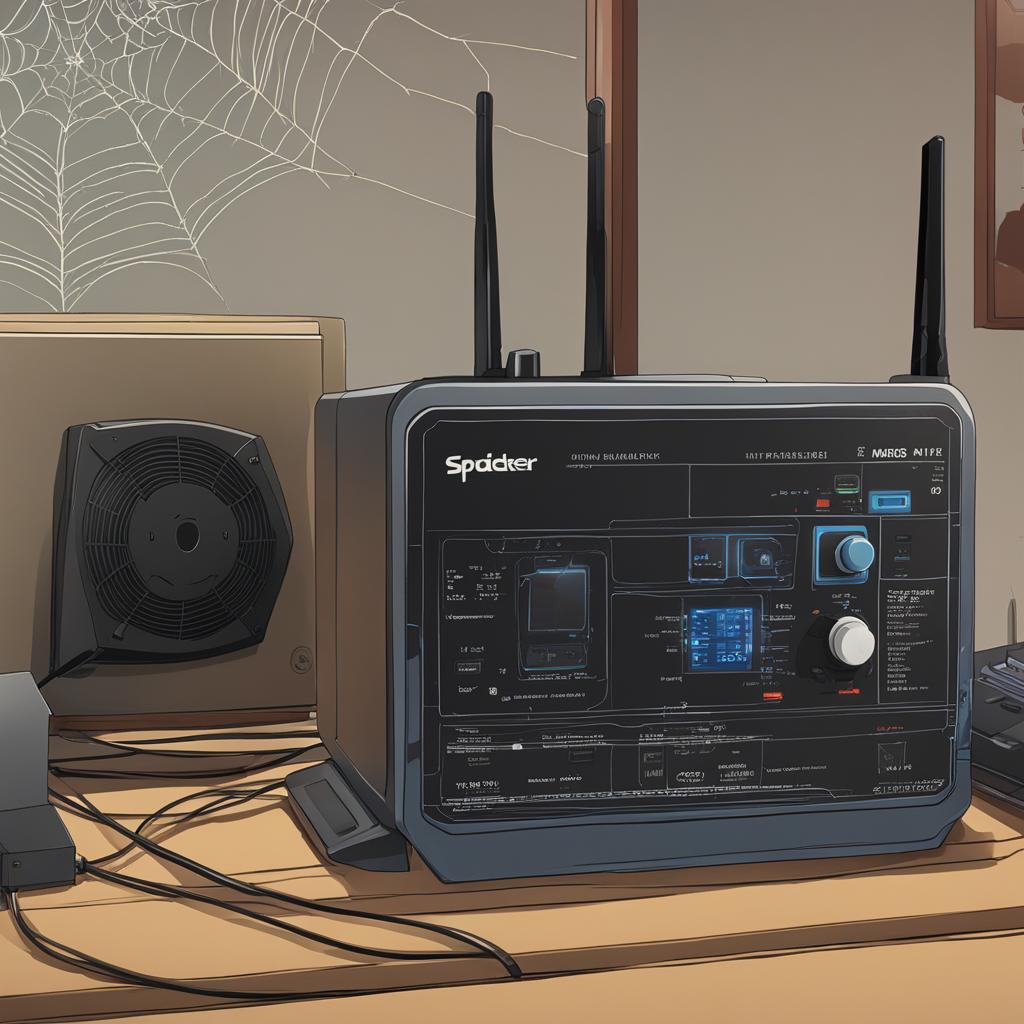Leaving your Wi-Fi router on while you’re on vacation can leave your network vulnerable to cyber attacks. Hackers can take advantage of the unoccupied time to breach your network and install malware. Unplugging your router severs the connection, making it impossible for cyber thieves to access your network without physical access to your devices. This ensures the security of your wireless network when you return home. Additionally, unplugging your Wi-Fi router can also save energy and reduce your electricity bill.
But here’s the burning question: Should you really unplug your Wi-Fi when you’re on vacation? Does it truly protect your network from cyber threats and does the energy savings make a noticeable difference? Let’s dive into the details and explore the reasons why you should consider unplugging your Wi-Fi router when you’re away.
Why Should You Unplug Your Wi-Fi on Vacation?
Unplugging your Wi-Fi router on vacation has several important benefits. By disconnecting your Wi-Fi, you eliminate the opportunity for cybercriminals to breach your network and install malware. This helps protect your personal information and keeps your devices safe from unauthorized access. You can enjoy your vacation without worrying about potential cyber attacks.
Moreover, unplugging your Wi-Fi router can also contribute to reducing energy consumption and saving on your electricity bill. Even though the savings might be small, every little bit helps in promoting a more sustainable environment. Taking this simple and eco-friendly step can have a positive impact on both your personal security and energy usage.
If you want to further ensure the security of your network, consider taking additional steps such as changing your Wi-Fi password. This adds an extra layer of protection against unauthorized access to your network. Remember to choose a strong and unique password, utilizing a combination of letters, numbers, and special characters.
In summary, unplugging your Wi-Fi router on vacation can provide peace of mind by protecting against potential cyber threats and saving energy. By taking these precautions, you can relax and fully enjoy your time away from home without compromising the security of your network or unnecessarily consuming electricity.
Does Unplugging Wi-Fi Extend the Router’s Lifespan?

Contrary to popular belief, turning off your Wi-Fi router frequently does not extend its lifespan. Major router manufacturers state that routers are designed to run continuously and turning them off and on frequently can actually shorten their lifespan.
However, it is recommended to turn your router off and on every 3-4 months or when experiencing networking issues to refresh the connection.
How Much Energy Does a Wi-Fi Router Consume?

When it comes to energy consumption, Wi-Fi routers are not power-hungry devices. In fact, they consume minimal amounts of energy, which translates to a negligible impact on your electricity bill. According to EnergySage.com, leaving your Wi-Fi router on all the time will only cost around $1.04 per month on average, depending on the model and brand.
While turning off your Wi-Fi router on vacation may result in some energy savings, the amount is relatively insignificant. So, if you’re looking to unplug your router solely to reduce your energy consumption and save on your electricity bill, it’s important to understand that the savings will be minimal.
Instead of focusing solely on the energy consumption aspect, consider other factors such as network security and the lifespan of your router before making a decision. Unplugging your Wi-Fi router on vacation can contribute to energy savings, but it’s just one piece of the puzzle.
Below is a table showcasing the average monthly energy consumption of different types of household devices:
| Device | Average Monthly Energy Consumption (kWh) |
|---|---|
| Wi-Fi Router | 0.25 |
| Refrigerator | 50 |
| Television | 10 |
| Laptop | 4 |
As you can see, the energy consumption of a Wi-Fi router is significantly lower compared to other common household devices. It’s worth considering the overall impact of your energy usage and weighing it against the convenience and security implications of leaving your Wi-Fi router on or off during vacation.
Remember, the decision to unplug your Wi-Fi router should be based on a holistic understanding of your needs, including energy consumption, network security, and personal preferences.
Key Takeaways
- Wi-Fi routers consume minimal amounts of energy and have a negligible impact on your electricity bill.
- The average monthly cost of leaving your Wi-Fi router on all the time is around $1.04.
- While turning off your router on vacation can result in some energy savings, the amount is relatively insignificant.
- Consider other factors such as network security and the lifespan of your router before deciding whether to unplug it.
Considerations for IoT Devices and Security

If you have IoT devices in your household that rely on an internet connection, such as wireless cameras, home security systems, or smart doorbells, it is advisable to keep your Wi-Fi router on while on vacation to ensure their proper functioning. These devices often require a constant connection to the internet for monitoring and remote access. By keeping your Wi-Fi on, you can ensure that these devices remain connected and operational, providing you with peace of mind.
However, if you are concerned about security, changing your Wi-Fi password to a strong and unique one can provide an extra layer of protection. A strong password helps prevent unauthorized access to your network and prevents potential vulnerabilities. It is recommended to create a password with a combination of upper and lowercase letters, numbers, and special characters. Changing your Wi-Fi password regularly is also a good practice to maintain network security.
You can change the password through the router’s admin dashboard or a dedicated app if available. Look for the “Settings” or “Security” section in your router’s interface to locate the option to change your Wi-Fi password. Follow the instructions provided by your router manufacturer for a seamless password update process.
Comparison of Wi-Fi Security Options
| Wi-Fi Security Option | Description | Level of Security |
|---|---|---|
| Keeping Wi-Fi On | Ensures continuous connection for IoT devices | Relatively high |
| Changing Wi-Fi Password | Adds an extra layer of network security | High |
| Disabling Wi-Fi | Cuts off access to network but also IoT devices | Very high |
By considering both the functionality of your IoT devices and your security concerns, you can make an informed decision about keeping your Wi-Fi router on or off while on vacation. Keep in mind that finding the right balance between convenience and security is crucial for creating a safe and efficient network environment.
Final Thoughts on Unplugging Wi-Fi on Vacation
When it comes to deciding whether to unplug your Wi-Fi router on vacation, it ultimately comes down to personal choice and specific circumstances. Unplugging your router can provide an additional layer of security by preventing unauthorized access to your network. This can help protect your personal information and keep your devices safe from potential cyber threats. Keeping your Wi-Fi off during your absence also allows you to have peace of mind knowing that your network is secure.
Aside from the security aspect, unplugging your Wi-Fi router on vacation can also contribute to some energy savings. While the impact on your electricity bill may be minimal, every little bit counts, especially in terms of environmental conservation. By reducing energy consumption, even in small ways, you are playing your part in creating a greener and more sustainable future.
However, it’s important to consider the potential impact on your router’s lifespan. Turning off and on your router frequently may actually shorten its lifespan, as most router manufacturers recommend leaving it on continuously. If you decide to unplug your router on vacation, it’s advisable to do so sparingly and only when necessary. Consider factors such as the length of your vacation, your router’s condition, and any networking issues you may have experienced before making a decision.
In the end, the decision to unplug your Wi-Fi router on vacation is a personal one that should take into account your own security concerns, the presence of IoT devices, and the overall energy consumption. Assess your specific situation and weigh the pros and cons before making a final decision. By making an informed choice, you can ensure the security of your network, contribute to energy savings, and prolong the lifespan of your router.
FAQ
Q: Should I unplug my Wi-Fi when I’m on vacation?
A: Unplugging your Wi-Fi router on vacation has several important benefits. By disconnecting your Wi-Fi, you eliminate the opportunity for cybercriminals to breach your network and install malware. This helps protect your personal information and keeps your devices safe from unauthorized access. Additionally, unplugging your Wi-Fi router can save energy and reduce your electricity bill. While the savings may be small, it’s a simple and eco-friendly step to take.
Q: Why should you unplug your Wi-Fi on vacation?
A: Leaving your Wi-Fi router on while you’re on vacation can leave your network vulnerable to cyber attacks. Hackers can take advantage of the unoccupied time to breach your network and install malware. Unplugging your router severs the connection, making it impossible for cyber thieves to access your network without physical access to your devices. This ensures the security of your wireless network when you return home. Additionally, unplugging your Wi-Fi router can also save energy and reduce your electricity bill.
Q: Does unplugging Wi-Fi extend the router’s lifespan?
A: Contrary to popular belief, turning off your Wi-Fi router frequently does not extend its lifespan. Major router manufacturers state that routers are designed to run continuously and turning them off and on frequently can actually shorten their lifespan. However, it is recommended to turn your router off and on every 3-4 months or when experiencing networking issues to refresh the connection.
Q: How much energy does a Wi-Fi router consume?
A: Wi-Fi routers are not power-hungry devices and consume minimal amounts of energy. According to EnergySage.com, leaving your Wi-Fi router on all the time will only cost around
FAQ
Q: Should I unplug my Wi-Fi when I’m on vacation?
A: Unplugging your Wi-Fi router on vacation has several important benefits. By disconnecting your Wi-Fi, you eliminate the opportunity for cybercriminals to breach your network and install malware. This helps protect your personal information and keeps your devices safe from unauthorized access. Additionally, unplugging your Wi-Fi router can save energy and reduce your electricity bill. While the savings may be small, it’s a simple and eco-friendly step to take.
Q: Why should you unplug your Wi-Fi on vacation?
A: Leaving your Wi-Fi router on while you’re on vacation can leave your network vulnerable to cyber attacks. Hackers can take advantage of the unoccupied time to breach your network and install malware. Unplugging your router severs the connection, making it impossible for cyber thieves to access your network without physical access to your devices. This ensures the security of your wireless network when you return home. Additionally, unplugging your Wi-Fi router can also save energy and reduce your electricity bill.
Q: Does unplugging Wi-Fi extend the router’s lifespan?
A: Contrary to popular belief, turning off your Wi-Fi router frequently does not extend its lifespan. Major router manufacturers state that routers are designed to run continuously and turning them off and on frequently can actually shorten their lifespan. However, it is recommended to turn your router off and on every 3-4 months or when experiencing networking issues to refresh the connection.
Q: How much energy does a Wi-Fi router consume?
A: Wi-Fi routers are not power-hungry devices and consume minimal amounts of energy. According to EnergySage.com, leaving your Wi-Fi router on all the time will only cost around $1.04 per month, depending on the model and brand. While turning it off on vacation can result in some energy savings, the amount is relatively insignificant. Therefore, the decision to unplug your Wi-Fi router should not be based solely on energy consumption.
Q: What are the considerations for IoT devices and security?
A: If you have IoT devices in your household that rely on an internet connection, such as wireless cameras, home security systems, or smart doorbells, it is advisable to keep your Wi-Fi router on while on vacation to ensure their proper functioning. However, if you are concerned about security, changing your Wi-Fi password to a strong and unique one can provide an extra layer of protection. You can change the password through the router’s admin dashboard or a dedicated app if available.
Q: What are the final thoughts on unplugging Wi-Fi on vacation?
A: Whether to unplug your Wi-Fi router on vacation ultimately depends on personal preference and specific circumstances. Unplugging your router can provide added security by preventing unauthorized access to your network. It may also contribute to some energy savings, although the impact on your electricity bill is minimal. However, it’s important to note that turning off and on your router frequently can shorten its lifespan. Consider your own security concerns, the presence of IoT devices, and the overall energy consumption before making a decision.
.04 per month, depending on the model and brand. While turning it off on vacation can result in some energy savings, the amount is relatively insignificant. Therefore, the decision to unplug your Wi-Fi router should not be based solely on energy consumption.
Q: What are the considerations for IoT devices and security?
A: If you have IoT devices in your household that rely on an internet connection, such as wireless cameras, home security systems, or smart doorbells, it is advisable to keep your Wi-Fi router on while on vacation to ensure their proper functioning. However, if you are concerned about security, changing your Wi-Fi password to a strong and unique one can provide an extra layer of protection. You can change the password through the router’s admin dashboard or a dedicated app if available.
Q: What are the final thoughts on unplugging Wi-Fi on vacation?
A: Whether to unplug your Wi-Fi router on vacation ultimately depends on personal preference and specific circumstances. Unplugging your router can provide added security by preventing unauthorized access to your network. It may also contribute to some energy savings, although the impact on your electricity bill is minimal. However, it’s important to note that turning off and on your router frequently can shorten its lifespan. Consider your own security concerns, the presence of IoT devices, and the overall energy consumption before making a decision.
